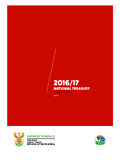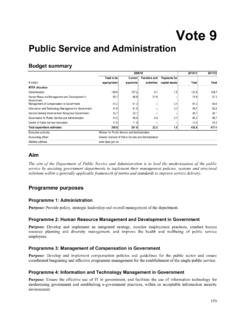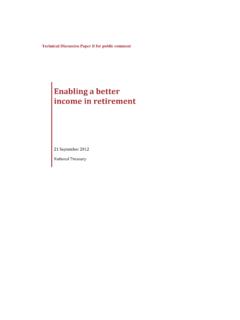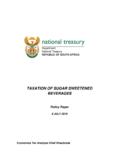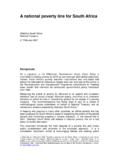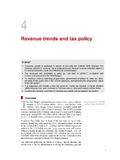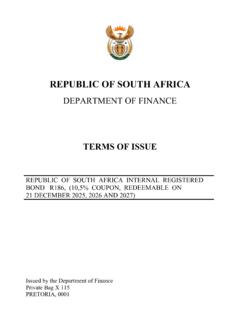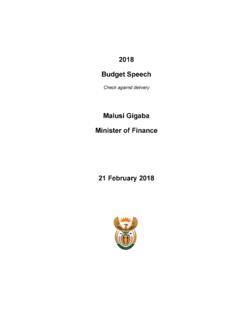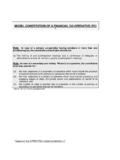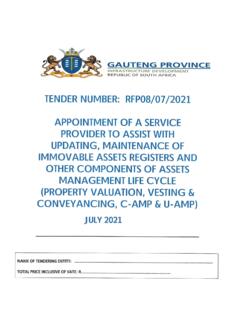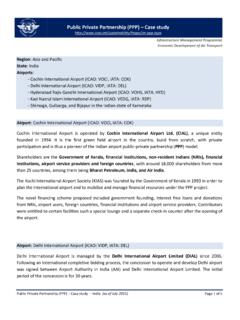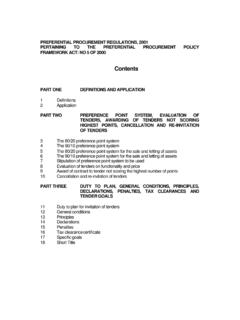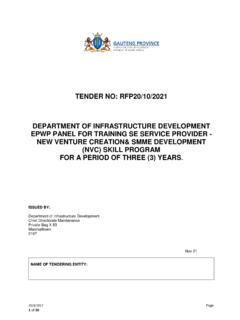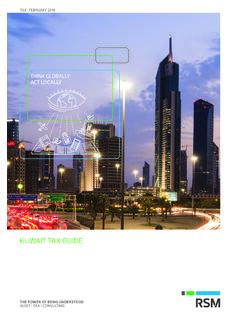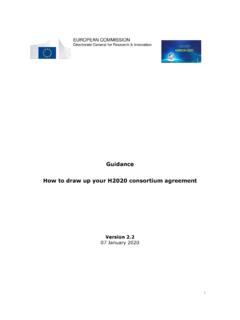Transcription of NATIONAL TREASURY REPUBLIC OF SOUTH AFRICA
1 NATIONAL TREASURY REPUBLIC OF SOUTH AFRICA Enquiries: S Maganedisa Tel: 012 315 5861 Fax: 012 315 5477 TO ALL: ACCOUNTING OFFICERS OF NATIONAL DEPARTMENTS AND CONSTITUTIONAL INSTITUTIONS HEAD OFFICIALS OF PROVINCIAL TREASURIES ACCOUNTING AUTHORITIES OF PUBLIC ENTITIES LISTED IN SCHEDULE 3A, 3B, 3C & 3D TO THE PFMA OR ANY SUBSIDIARY OF ANY SUCH ENTITY NATIONAL TREASURY PRACTICE NOTE NO 11 OF 2008/2009 UNSOLICITED PROPOSALS 1. PURPOSE This practice note provides precise guidelines for institutions dealing with unsolicited proposals/concepts. An unsolicited proposal/concept means any proposal/concept received by an institution outside its normal procurement process that is not an unsolicited bid (a submission that must be innovative, unique and provided by a sole supplier). This practice note defines the parameters of an unsolicited proposal/concept, provides a mechanism for their deliberated consideration and establishes consistency in approach both by government and the private sector.
2 This practice note has been drafted in order to provide government with a framework within which unsolicited proposals/concepts may be considered. It explains how unsolicited proposals/concepts should be dealt with by institutions through setting out procedures that must be followed. These procedures will result in an environment where advantage can be taken of the private sector s capacity to conceptualise, package and develop projects whilst ensuring and protecting public policy objectives at the same time. 2. CRITERIA FOR CONSIDERATION OF AN UNSOLICITED PROPOSAL Institutions are not obliged to consider an unsolicited proposal but may consider such a proposal only if it meets the following requirements: (a) a comprehensive and relevant project feasibility study has established a clear business case; and (b) the product or service involves an innovative design; or (c) the product or service involves an innovative approach to project development and management; or (d) the product or service presents a new and cost-effective method of service delivery.
3 The unsolicited proposal must contain the following information in terms of the proponent: (a) the proponent s name, address, identification or registration number (if a corporation), VAT registration number and the contact details of its authorised representative; (b) identification of any confidential or proprietary data not to be made public; (c) the names of other SOUTH African institutions that have received a similar unsolicited proposal; (d) the proponent s current SARS Tax Clearance Certificate and in the case where the proponent is a consortium or joint venture , a current SARS Tax Clearance Certificate for each member thereof; (e) a declaration of interest containing the particulars set out in Standard Bid Document (SBD) 4, issued by the NATIONAL TREASURY , (f) a declaration of the proponents past supply chain practices containing the particulars set out in SBD 8, issued by the NATIONAL TREASURY ; and 2 (g) a declaration from the proponent to the effect that the offering of the unsolicited proposal was not as a result of any non-public information obtained from officials of the relevant institution or any other institution.
4 A proponent means any person, whether natural or juristic, that submits an unsolicited proposal to an institution The unsolicited proposal must set out the following information in terms of the product or service offered: (a) a concise title and abstract (approximately 200 words) of the proposed product or service; (b) a statement of the objectives, approach and scope of the proposed product or service; (c) a statement describing how the proposal is demonstrably innovative and supported by evidence that the proponent is the sole provider of the innovation; (d) a statement of the anticipated benefits or cost advantages to the institution including the proposed price or total estimated cost for providing the product or service in sufficient detail to allow a meaningful evaluation by the institution; (e) a statement showing how the proposed project supports the institution s strategic growth and development plan and its other objectives; and (f) the period of time for which the proposal is valid for consideration, which may not be less than six months.
5 3. UNACCEPTABLE UNSOLICITED PROPOSALS The accounting officer or accounting authority must reject the unsolicited proposal if the proposal- (a) relates to known institutional requirements that can, within reasonable and practicable limits, be acquired by conventional competitive bidding methods; (b) relates to products or services which are generally available; 3 (c) does not fall within the institution s powers and functions; (d) does not comply substantially with paragraph 2; (e) has not been submitted by a duly authorised representative of the proponent; or (f) contravenes the provisions of any law. If the accounting officer or accounting authority decides to reject the unsolicited proposal, he or she must (a) notify the authorised representative of the proponent by registered post, at the address referred to in paragraph (a), that the institution has rejected the unsolicited proposal; (b) ensure that the institution does not make use of any of the intellectual property or proprietary data in the unsolicited proposal; and (c) return to the proponent by registered mail to the address referred to in paragraph (a), all documents received in the unsolicited proposal including any copies of these documents.
6 4. EVALUATION OF COMPLIANT UNSOLICITED PROPOSALS If the accounting officer or accounting authority decides to consider the unsolicited proposal, he or she must send a registered letter to the address referred to in paragraph (a) confirming the decision to consider the unsolicited proposal. The unsolicited proposal must be considered as appropriate in terms of the following Compliant unsolicited bid. If a submission to an institution complies with the requirement of existing unsolicited bid provisions in terms of the NATIONAL TREASURY issued circular entitled Implementation of Supply Chain Management (dated 27 October 2004), namely the product or service is unique, innovative and provided by a sole 4 provider, the institution may enter into direct negotiation with the proponent, outside the normal competitive bidding process.
7 Public Private Partnership compliant unsolicited proposal. If the unsolicited proposal is a PPP, the accounting officer or accounting authority must comply with the requirements of TREASURY Regulation 16 and the Practice notes relevant thereto, as read with paragraph of this practice note. Non-Public Private Partnership compliant unsolicited proposals. If the unsolicited proposal is not a PPP, the institution must undertake a comprehensive evaluation of the unsolicited proposal, which must include the following: (a) A feasibility study that evaluates the costs and benefits of procuring the product or service from the proponent, including, as appropriate, an assessment of -- (i) any unique, innovative, researched or meritorious methods, approaches or concepts demonstrated in the unsolicited proposal; (ii) the overall scientific, technical, or socio-economic merit of the unsolicited proposal; (iii) the potential contribution of the unsolicited proposal to the institution s strategic objectives as identified in its strategic growth and development plan.
8 (iv) an assessment of whether the proposed cost of the project is realistic, affordable and justified; and 5 (v) any other fact which, in the opinion of the institution is relevant to the particular unsolicited proposal. (b) If at the conclusion of the feasibility study the institution determines that the criteria set out in paragraph 2 are met, the institution must proceed with the processes to develop and execute an unsolicited bid agreement as set out in paragraph below. (c) If the institution determines that the criteria set out in paragraph 2 are not met, the institution must follow the procedures set out in paragraph above. Unsolicited proposal agreement. If the institution decides to proceed with the unsolicited proposal, the accounting officer or accounting authority must negotiate an unsolicited proposal agreement with the proponent.
9 The sole purpose of the unsolicited proposal agreement is to guide the process in terms of this practice note between the institution and the proponent, in order to, establish, amongst other matters (a) The methodology for determining any costs to be reimbursed to the proponent, should the procurement processes set out in paragraph 5 below result in an award for the product or service being made to a party other than the proponent; (b) the procedure for further developing the project and responding to issues raised by the institution; (c) the allocation of responsibility for developing bid documents in accordance with the institution s supply chain management 6 systems, provided that development of the document must always be under the supervision of the institution; (d) the information in the unsolicited proposal must be treated as confidential; and (e) the purchase of intellectual property rights, if any.
10 Calculation of costs. In calculating costs for the purposes of paragraph (a), the institution and the proponent must restrict their consideration to direct costs incurred by the proponent in developing technical and other materials relevant to meeting the criteria set out in paragraph 2, above. If the institution and the proponent cannot reach consensus, then- (a) the institution will not be responsible for any costs which the proponent has incurred in preparing and submitting the unsolicited proposal; (b) the institution may not implement the project proposed in the unsolicited proposal for the current or next financial year and may not utilise at any time the proprietary information provided by the proponent as part of its unsolicited proposal. 5. PROCUREMENT If the unsolicited proposal agreement is concluded, then the institution must prepare and issue bid documents.
